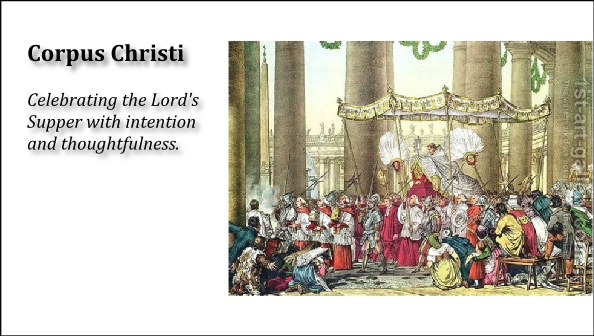By Tyson Thorne

Tomorrow the liturgical church celebrates Corpus Christi, a Christian feast celebrating Communion. Most protestant churches do not celebrate the event as it is a decidedly Catholic invention, and one that espouses a very different theology surrounding the Communion elements (bread and wine) than does the non-liturgical churches. Because of the theological element its worth understanding the holiday.
The holiday began in Liege, Belgium in 1192 thanks to a a very humble and giving woman named Juliana de Cornillon, making this an unusual holiday in church history as women heretofore have rarely had much say in church business. Juliana voluntarily ran the leprosarium and convent at Mont-Cornillion, a difficult and exhausting charity. The event is celebrated by a procession through the streets near a monastery or church with the Eucharist (wine vessel) used in communion. Those identifying with Jesus in the last supper follow the procession back to the parish for a communion service.
To be sure, following the procession identifies one’s belief in Jesus in a public fashion which is always a good practice. Protestants have difficulty identifying themselves in public with Jesus with the exception of fish emblems on the back of their cars. Depending on the neighborhood this public proclamation may have dire consequences.
However, the celebration itself borders on Eucharist worship, as a priest holds the vessel aloft during the parade making it the center of attention. What is the bread and the wine of communion without the last supper? They are nothing on their own but become meaningful when identified with Jesus. Which brings us to the theological distinction alluded to earlier.
Catholics, Anglicans and a few other liturgical branches of Christianity believe in a concept called transubstantiation. This is the belief that, once consumed, the wine and the bread literally become the actual blood and flesh of Jesus. (This is the origin of some early misunderstandings between Christianity and unbelievers, the later thinking that Christians were cannibals.) Most protestant churches believe in consubstantiation. This is the belief that the wine and the bread symbolize the blood and body of Christ, and that by partaking of it we identify ourselves as partaking of the sacrifice Jesus made on our behalf.
Such focus on the elements was never intended. In fact, the institution of the Lord’s Supper occurred during a Passover Seder dinner. With the third cup of wine, called the Cup of Redemption, Jesus identified his work (which was soon to be accomplished) with the Passover tradition. Since the Passover meal is full of symbolism, it follows that the elements of Communion are also symbolic representations of the Messiah’s work. As a symbol, it should never be elevated to an object of religion or worship, a line the holiday Corpus Christi may in fact cross regardless of its intentions.
All in all, I confess that I would like to see the protestant churches treat Communion with more respect than most do. Jesus said he would not celebrate the Lord’s Supper until he has drawn all his children to himself, and there are stern warnings against taking of it lightly, or in a manner that is not worthy of the occasion. For this reason I would not permit children to partake of the communion elements, for the table is meant for those who understand the imagery and who are capable of self-examination of one’s place with God. Thinking Biblically about Communion does require significant thoughtfulness; hopefully these words will help you in your understanding and practice.
|
|
|
